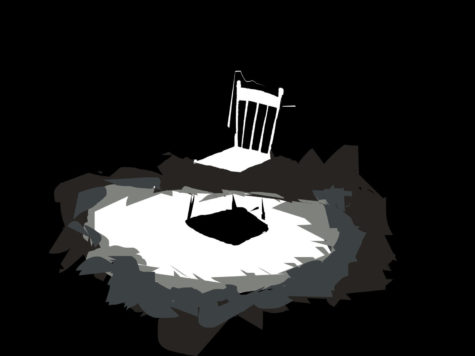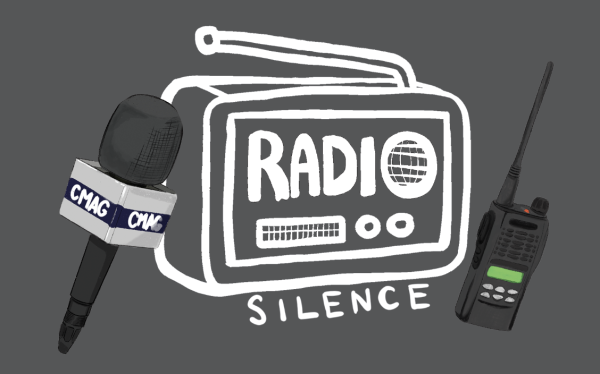Broken Rituals
Two pledges, two experiences.

A pitch black room. New pledges shoved to the edges of the space, elbow to elbow. Suddenly, out of the darkness, a crackling sound comes out and the boys whip their necks, fearful of what will ensue.
A recording blasts: “Welcome to the first of the 1996 Presidential debates between President Bill Clinton, the Democratic nominee, and Senator Bob Dole, the Republican nominee.” It’s the 1996 presidential election on max volume vibrating through the screen.
Traditions of initiation are common among college fraternities, but when so called “playful” bonding pushes the boundaries of young students, hazing becomes a part of the culture.
Ryan, whose real name has been changed to keep his identity private had an intitiation experience with quirky and unharmful traditions. “I was locked in a room and listened to the 1996 presidential debate in the dark, which was on full blast volume, which was pretty wack,” Ryan said.
He pledged to a frat that did not promote the overconsumption of alcohol, which made his initiation a unique and wholesome experience. The lack of abuse and pressure in this fraternity completely changed his view of college and Greek culture on campus.
“In terms of not drinking, that definitely brought us together in an interesting way because it forced us not to do something that college students tend to do on a regular basis,” Ryan said. His safe and respectful initiation brought his entire class of new pledges together and sent them into their four years of college with a sense of excitement for this new community.
This form of hazing in Ryan’s frat where alcohol is not encouraged is different than many other frats at other colleges or around his campus. New members understood that they had to earn their place in the fraternity by undergoing the same initiation as all brothers did, but were not forced into uncomfortable situations solely for the amusement of upperclassmen.
When he was finally introduced to the brotherhood, the real benefits of being in a fraternity became evident.
“Social life is definitely dictated by greek life in [college], and in that aspect it really has given me the ability to branch out socially,” Ryan said.
His involvement in Greek life allowed Ryan to maintain a social life, with parties at least twice a week and a group of friends closer than he had ever experienced.
Outside of the fraternity, his relationships with friends still held fast. “[The brotherhood] led to connections to some of my best friends for the rest of my life,” Ryan said. He now has a group of friends he knows he will reunite with in the future, and be able share the memories of all the insane moments from their college experiences.
Hazing, however, is backed by a long history of distaste. Hazing isn’t just youthful irresponsibility, much of it fosters hostile environments, rather than the intended kinship in brotherhood.
One of the most extreme cases was set at an Ivy league school involving a student on the water polo team. In the interest of the student’s privacy, his name has been changed to James.
After just 24 hours of being at the fraternity, James instantly sensed the culture of his new home.
“The first night I was there we went to a team bonding party at one of the frats and it got intense pretty quick,” James said. “I had to finish 40 [ounces] of malt liquor and wasn’t allowed to leave until I did.”
The team pressured the newcomers to drink extreme amounts of alcohol and made it clear that this was a necessary in order to be a part of the team.
Some embraced it and became close with the rest of the team that night, but James and others did not respond well to the culture of excessive drinking. “It made something which I was excited for [playing water polo] a stressful and dangerous job,” James said.
Initiation lasted for a few weeks for the freshmen, running multiple nights a week for a two-month period during which new athletes were forced to drink unhealthy quantities of alcohol. It soon became clear to James that this was not just about being a freshman; excessive drinking was a crucial part of being on the team.
“I realized that even when I wasn’t being forced to drink I was still under extreme pressure to drink,” James said. “Anyone who didn’t keep up was alienated that night and the next day at practice.”
Upon realizing that this was not the college experience he wanted, James left the Ivy and transferred to a smaller liberal arts school in Minnesota.
“[Hazing] changed my entire experience of college,” said James. “I was excited to go to such a good school and water polo team, but it was too much,” James said. “I now realize that it was definitely the right choice for me [to leave] and I grew to love my new school.”
The aggressive pressure he experienced was not initiation, it is what made him want to leave. Not only did he get driven out of opportunity, but his perceptions of college Greek life was stained forever.
College can be full of drinking and social pressure, but when it puts the students in dangerous and outrageous situations, it becomes hazing. Initiation is a fun and welcoming way to form a community, but hazing is an entirely different beast that doesn’t belong on college campuses.






